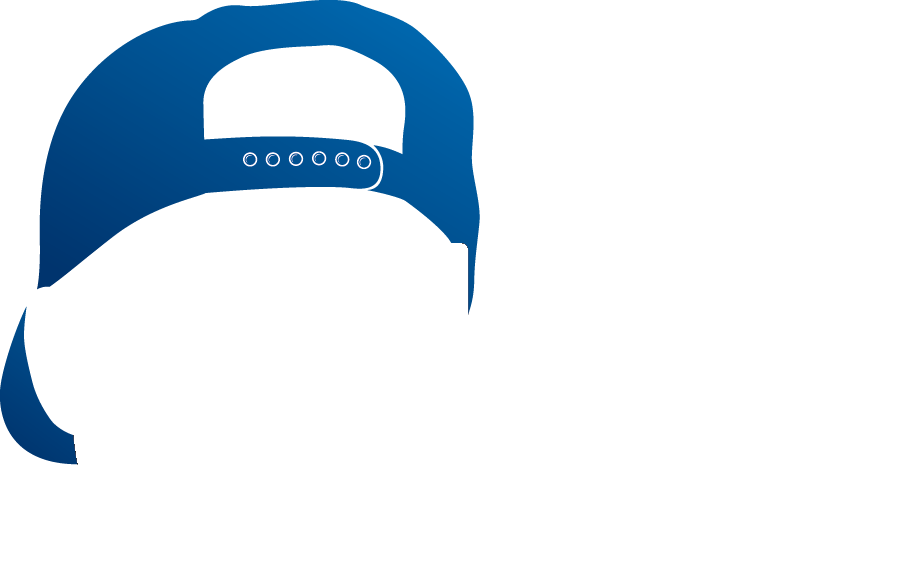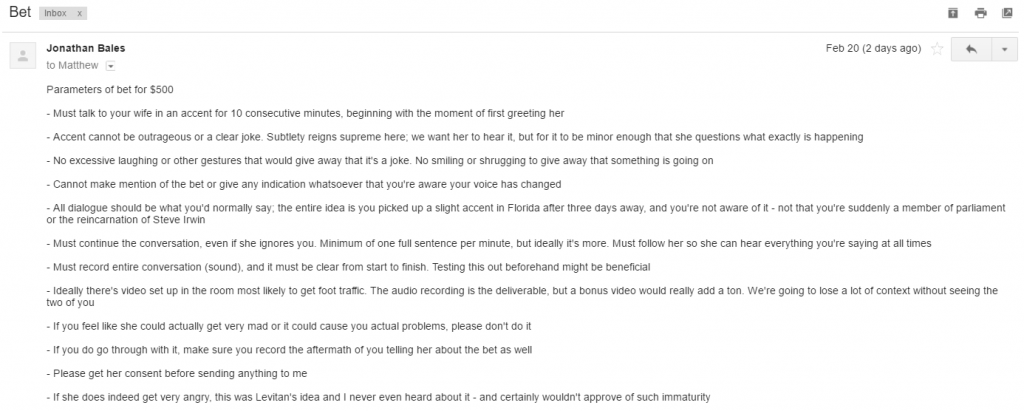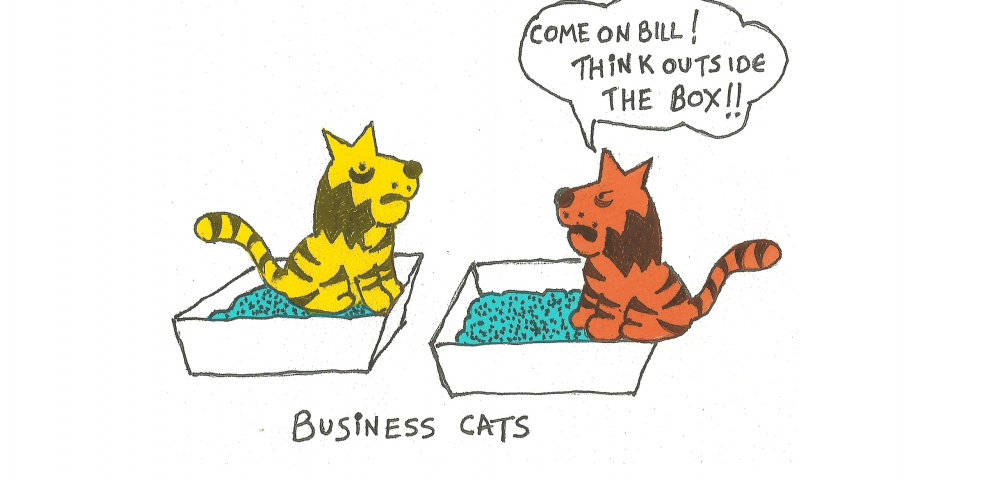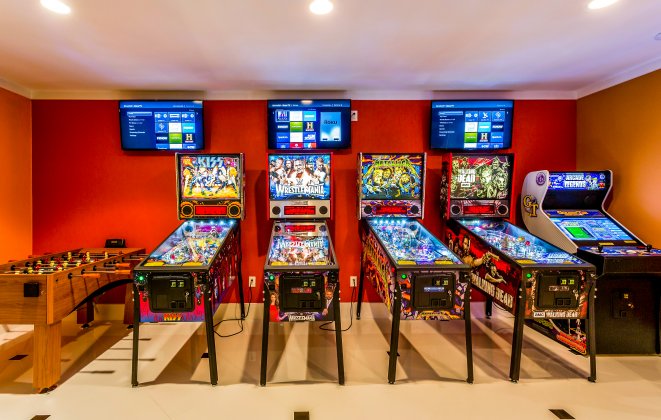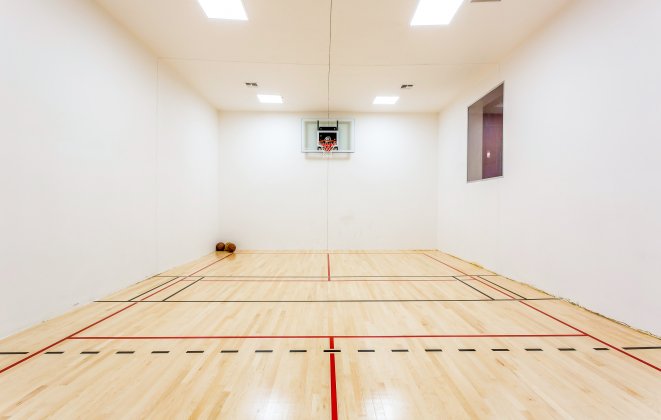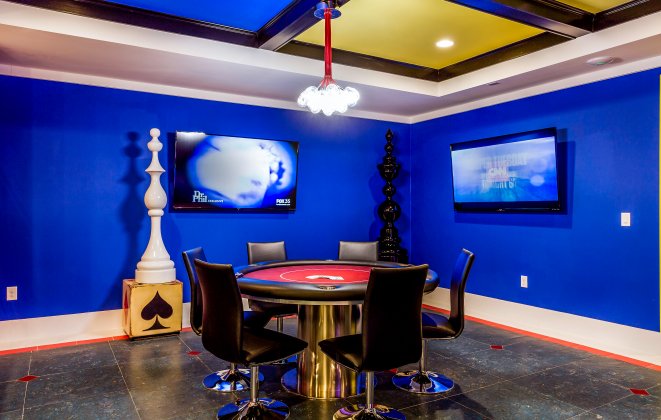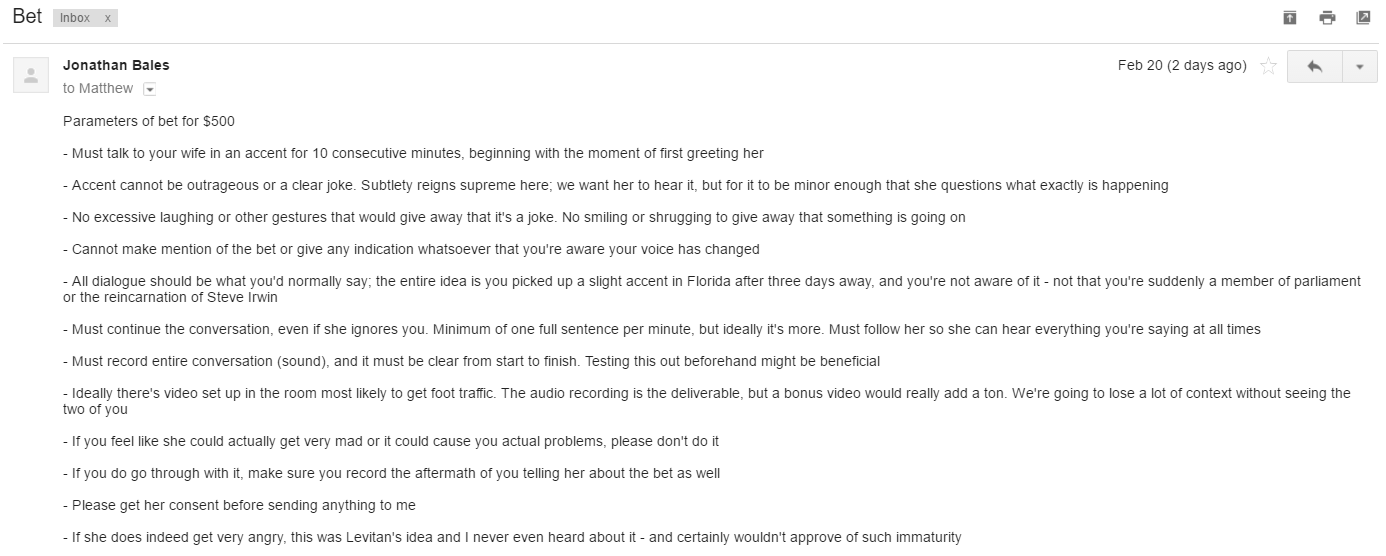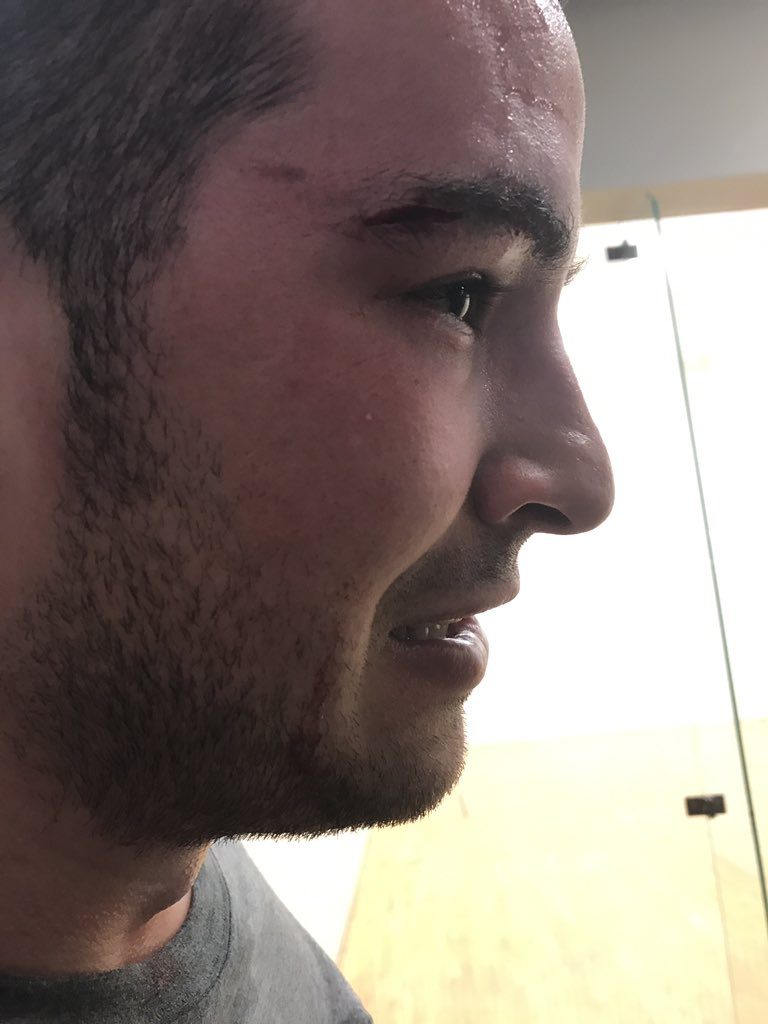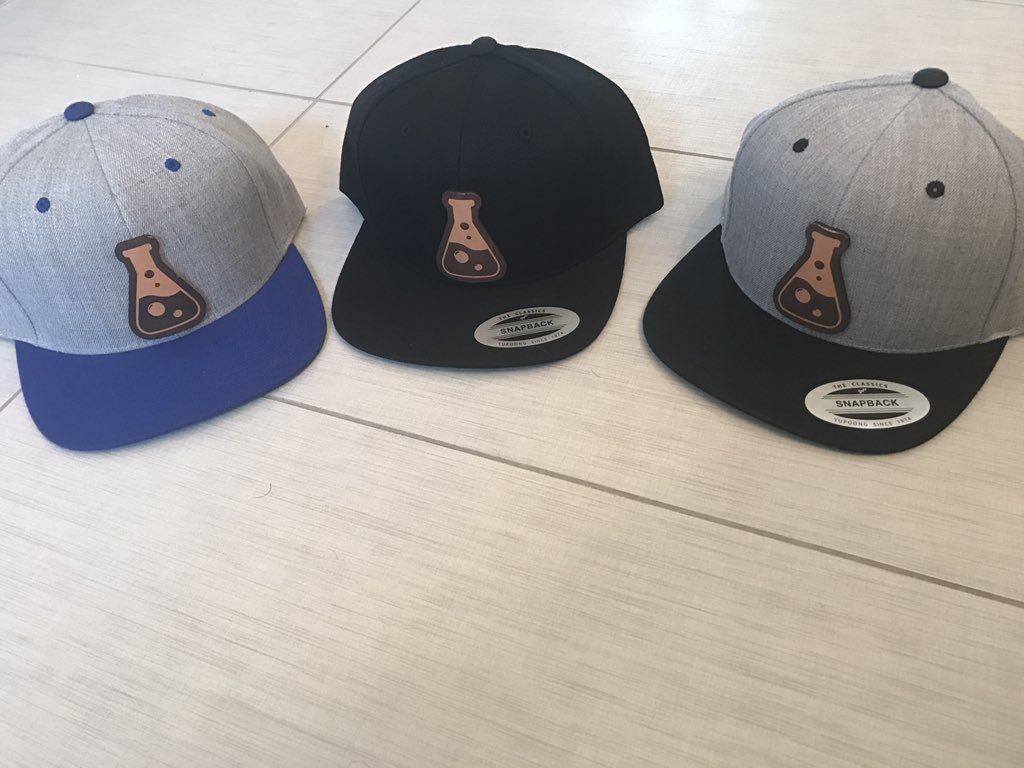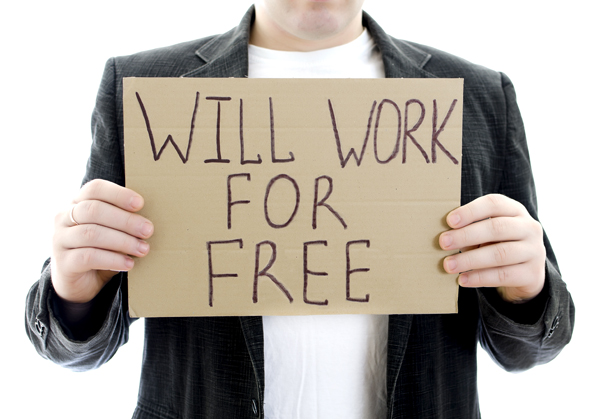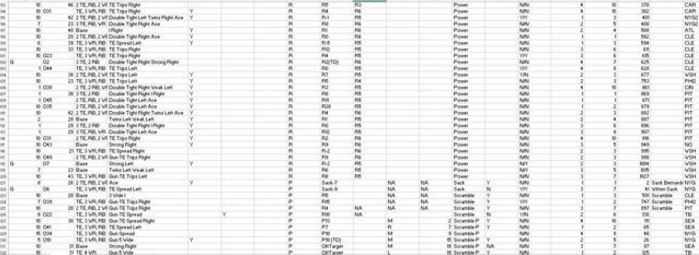I have a little bio on the landing page of this site. Here’s part of it:
Who cares where I went to school or what’s on my resume? I also don’t want to reveal the fact that I’ve never had a real job, because that would make me look #inexperienced—unless you consider the following things I did to be jobs: tried to become a famous artist, sold a lot of stuff on eBay (including my soul, which I think I still have because eBay removed the listing), bought a whole bunch of glass after receiving horrible advice from my grandfather to “buy all the glass you can get your hands on, trust me,” became a magician, bought an acre of swampland in Louisiana for the investment potential, became a competitive eater (retired three hot dogs in), and started a few other businesses I’ve been advised by my lawyer to not even talk about. Talk about a fucking resume.
So if you’ve arrived at this post and you’re asking why I’m qualified to talk about building a business, there’s your answer. They say the greatest entrepreneurs are the ones who fail the most—idk who ‘they’ are or if anyone actually says that, but it seems like it could be true—and so I’m more qualified than anyone to talk about this stuff because almost everything I’ve ever done has been a colossal failure.
You don’t know business until you’re knocking on strangers’ doors at 5am to convince them to sell you their glass…or working on inventing new card tricks as a career move…or marketing yourself as a famous artist halfway through your first ever oil painting…or trying to sell a plot of land in a fucking swamp you’ve never visited.
Now that I’ve established ultimate credibility, you’re probably very interested in learning from me. “Look at his history of failure! He must be an amazing entrepreneur with all those fuck-ups,” you’re likely saying to yourself. Really though, I’ve learned so much over the years by messing up. Figuring out what not to do is sometimes the most valuable information you can gather.
I was initially going to title this post “Tips for Building a Business,” but as I jotted down some thoughts, I realized that pretty much everything I was writing was the opposite of how you’re “supposed” to do things. My typical day is evidence of that. Everyone is taught the same sort of stuff for how to “succeed” in life or make money or start a business, and for the most part, we just blindly accept it even though 1) the advice sucks ass and 2) there’s inherent value in doing things differently.
So my list of ways to succeed in business (even if you aren’t self-employed or an entrepreneur) is for the contrarians out there who don’t want to follow the rules.
Do stuff.
“Fuck, I gave this guy the benefit of the doubt after reading through that shitty intro and his first tip is to do stuff.”
Every time I see how most businesses operate, I’m dumbfounded by how much time is spent either working on meaningless stuff or not working at all. The truth is most people prioritize feeling like they’re accomplishing things over actually being productive.
When in doubt about how to proceed, do actual work related to improving the core part of your business. Stop with the phone calls and aesthetics of your logo and monitoring Twitter every 30 seconds. You’ll have the most success focusing on a few items you know will have a major positive impact.
Get distracted.
It’s okay to go off on a tangent.
In a recent FantasyLabs podcast, DFS player BeepImaJeep (Jay Raynor) talked about how he’s trying to find buried treasure in the Rockies. No really, he’s leaving this month to try to find this treasure.
Jay was the main subject of the Dan Barbarisi book on DFS—Dueling with Kings—and I recently saw Dan and we started talking about Jay’s quest for this treasure. Dan mentioned Jay will sometimes go down a rabbit hole researching something, and many times it ends up being fruitless and feels like wasted effort. But sometimes it’s not, and Jay’s tendency to get “distracted” in the right way is why I think the kid is going to find $2 million dollars of buried treasure.
You’re going to have ordinary results if you have a conventional process. Give yourself freedom to be creative, even if it doesn’t always lead to short-term results.
No one ever found treasure in the middle of a popular trail; it’s hidden in the areas yet to be explored.
Don’t plan much.
It’s good to have a vision, but excessive planning ends up being inefficient because 1) things change and you need to adapt, and 2) you want to be nimble with no unnecessary hurdles that could jeopardize your ability to switch course.
Quit.
You’re going to have lots of bad ideas. Most of your ideas are probably awful. Mine are. Give up on them. Don’t see them through. It’s a waste. For the most part, when an idea is a winner, you know it pretty quickly. Whether it’s a single feature of your business or the entire concept, if it isn’t working early, you shouldn’t actually stick with it unless there are additional signs it will improve.
They say you should quit while you’re ahead, but you should also quit while you’re down only a little (money, time, energy). Quitters win.
Collect emails before making money.
If you’re starting a business and unsure of where to start, spend time finding creative ways to get emails from your target audience. There’s everlasting value in those emails as a primary avenue of communication with potential customers.
Don’t save money.
You should save money until you have some safety—whether it’s operating capital for a business or just cash in the bank personally. After that, saving money is for suckers, in my opinion. No one gets rich by saving money; they get rich by making more money. I think that’s really, really important, so I’m going to repeat it: if you want to get rich, figure out ways to make a lot more money. Seems obvious, right? Invest in yourself and your business and don’t hoard money unless it’s part of a long-term play to make more money.
Don’t work on cultivating your “brand.”
Just be yourself and if people like and connect with it, that’s great.
Don’t be a good boss.
Don’t be a boss at all. Be a leader. The best leadership comes when people don’t even know they’re being led.
Don’t always compete.
I hate to lose. Hate it. Any success I’ve had stems from wanting to crush anyone who thinks they can do something better than me to the point that they’re demoralized and give up.
But you have to know when it’s smart to compete. If you focus too much on winning, it’s easy to forget that what you should really be doing is making new rules for how the game should be played.
Don’t listen to customers.
Just kidding. Sort of.
You should listen to your customers at times when it comes to small features. If an aspect of your product/service is “off,” they can tell you that.
But, there are other good reasons to not listen to customers (and, generally speaking, I think you should ignore them more than you listen).
One reason is because the types of customers who speak up generally aren’t representative of all customers. At FantasyLabs, a disproportionate amount of our support is provided to free users. Some of them pay us nothing, have no intention of ever paying us a dime, and bitch about literally everything they could possibly bitch about. It’s bananas. At the other end, you have super hardcore users who might want very advanced features that could be cool, but won’t really help the business.
Another reason is because most people don’t actually know what they want or need. If we listened to customers, we never would have built Player Models, which was a totally unique concept. You can and should adjust minor things you’re doing based on customer feedback, but don’t just build out everything customers say they want because they’ll typically just give you minor variations of things that already exist.
Take lots of risks.
Don’t take risks for the sake of it, but generally, most value comes when you’re not afraid to take on risks others are avoiding.
SUCCESS Magazine did a story on risk with a really, really, really ridiculously good-looking male model as the subject.
Don’t optimize your day.
You should be striving to be as efficient as possible, but who says it needs to be done over the course of 24 hours? If you’re trying to help your business as much as possible in any particular day, you couldn’t do anything that provides long-term benefits.
I wrote about this concept in my post on working for free:
The merits of working for free change based on your timeline. I’m a big believer in the long game. I think most people optimize for right now and it’s +EV simply to make decisions based on what’s most beneficial down the line.
Simple examples: reading, sleeping well, and working out. All stupid uses of time if your goal is to optimize your day, but all some of the most vital aspects of creating long-term happiness/wealth/well-being. If the question is “How can I extract maximum value out today?” you probably shouldn’t work out, for example. It sucks ass. I’ve tried it. Not fun. But if the question is “How can I create the most value for myself (happiness, money, however you want to define ‘value’) in, say, 2019, then you should probably create a long-term foundation for success, with reading, working out, and getting rest being among the most +EV things you could possibly do.
In many ways, this is what we’re trying to do at FantasyLabs. Not just in creating long-term customers by providing a foundation for solutions instead of one-off “answers,” but also in terms of the basic philosophy and structure of the company (which uses a “freemium” model).
At FantasyLabs, we give so much away for free. Almost all content is free. Most of the tools are free. I love free. Are we maximizing revenue right now? No. Our subscription is quite underpriced (in my opinion), even though it’s among the highest in DFS. We don’t try to squeeze money out of people to artificially inflate monthly revenue. We’d rather give away too much for free than too little because “too much” really doesn’t exist if you have “the longest view in the room,” as Sam Hinkie said.
Fundamentally, I think we’re all trying to strike a balance between maximizing money/value/happiness right now versus creating a sustainable foundation for long-term value generation. At one end, working for free makes no sense. At the other, you should work for free all the time because it provides value to the maximum number of people.
The optimal balance, then, is completely dependent on time—for when you’re trying to optimize.
Think about how to build the best possible business in five years. Do things that will lead to that result.
Work for free.
Speaking of working for free…here’s the full post.
Think about how you’re supposed to do things…and then say “fuck that.”
It’s okay to act in a conventional way at times. Sometimes it’s faster and, especially in non-competitive situations, there’s no downside to doing things like others do them.
But in the same way you shouldn’t be contrarian for the sake of it, you shouldn’t follow all the rules for the sake of it, either. And if you’re not sure which direction is right, chances are it’s the one others don’t pursue because it makes them uncomfortable.
Don’t start a business in the real world.
I’m biased, but I prefer online businesses as opposed to those out there in the “real world.” First, it’s scary out there. You have to leave the house. You have to talk to people. No thanks. Second, you can track everything online. And third, it’s easier to scale, say, an online boutique as compared to a physical one.
Bet on yourself.
I like prop bets like these. Anything that gives you an incentive (with personal downside) to accomplish your goals.
Don’t advertise.
Not advertising seems pretty extreme, but what I really mean is you should sell not by buying traditional ads and being blatantly obvious you’re advertising, but rather by genuinely helping people and becoming trustworthy within your space.
Don’t buy ad space on a website. Do a guest post.
Don’t purchase social ads. Become a valuable follow for your target audience.
Don’t advertise via someone else’s email list. Build your own by giving people things they want.
Don’t tell someone why they should give you money. Show them by writing a minimum of 19 books.
Show people how you can help them by actually doing it instead of just shouting it at them.
Skip meetings.
I mentioned this one earlier, but I think it’s really important. Meetings suck. They’re almost never worth the time. Communicate via email—where everything is tracked and can be viewed at any time—and hold meetings only when absolutely essential.
Related: FantasyLabs uses Slack and Sprintly for communication and project tracking.
Read and write.
Here’s a list of some books I like. Reading is time-consuming, but perhaps the most beneficial thing you can do long-term. When you read a great book, it can fundamentally change how you think about the world and solve problems.
Reading also leads to better writing, which I think is an undervalued asset for pretty much anyone who needs to communicate via email. Clear writing is a sign of clear thinking.
Side note: I was thinking about writing a book on how to communicate effectively via email to get whatever it is you want. Who’d buy it?
Don’t be second-best.
Being No. 2 is really bad because you’re in a really tough spot with pricing. I’m really interested in pricing psychology and there’s a ton of evidence that people really have no idea what most stuff is “worth”—it’s completely relative—and they mostly base their decision off of certain cues or anchors.
Well, if you’re second-best and the top company charges, say, $100 for whatever it is they’re selling, you can’t get too close to that price because customers will then have an apples-to-apples decision of which product/service to choose. If you’re No. 1, however, you set the going rate for what something “should” cost.
Plus, you should be building the best thing you can anyway and shouldn’t be satisfied being No. 2 just because who the hell wants that?
Charge more money.
I’ve learned this lesson through experience. It’s much easier to come down in price than it is to go up. Once you set the expectation of what something is worth, good luck trying to get people to pay more.
Don’t be balanced.
I’ve already written about balance and why I hate it.
Don’t multi-task.
Do one thing at a time and focus all of your attention on that one specific thing. Then take a break. Focus on something else and put all your energy into that. Take another break. Trying to solve multiple problems at once leads to solving none.
Don’t worry about competitors.
While you shouldn’t be naïve to real competition, don’t worry too much about what others are doing. If you’re focused on unique solutions and being as innovative as possible, it really won’t matter what anyone else is doing. FWIW, this is probably truer for small businesses than like McDonald’s or something. So if the CEO of Ford is reading this for pointers, I apologize for the poor advice, Mark.
Don’t work long hours.
Working 12-hour days is fine at times, but those who brag about working ridiculous hours are either not working very productively (most likely) or going to burn out. I’m a big believer in working intensely for shorter durations—“sprints”—and the timing of those should be fluid based on when you’re in a “flow state” of intense hyperfocus. Not only do I think this is best long-term, but I also think you only have so much energy to give over a specific period of time such that extended periods of truly efficient, productive work are impossible.
Show me someone working non-stop at peak efficiency for an entire day and I’ll show you someone on Adderall.
Also, take Adderall. (That’s a joke.)
Don’t read resumes.
Read the email they send and how (or if) they sell themselves in it.
Overcompensate employees.
In the same way optimizing for today leads to sub-par long-term results, underpaying employees is a poor long-term strategy. You’ll more than make your money back by ensuring employees are happy, feel fulfilled, have creative freedom, and have upside in the future.
Find complementary pieces.
There are certain things I do well, and other things at which I’m terrible. While I’ve naturally improved some of my weaknesses over the years, the smartest thing I did was find a business partner—CSURAM88—who complements my skill set and fills in the gaps. The areas in which I naturally struggle—verbal communication, networking, building relationships—are where Peter kills it. Similarly, the other founders at FantasyLabs are complementary to me and one another, and so my only objective is to just not terribly fuck up the whole dynamic.
You should certainly patch up your weaknesses so they aren’t huge leaks, but sometimes the best way to do that is with the right teammate so you can focus on making your strengths that much better. Again, trying to manufacture personal balance when it isn’t there typically won’t help you as much as being the absolute best in a couple areas and working hard to intensify and market those strengths. I don’t care what it is; if you’re the best in the world at it, you can make money and be successful.
Be selfish.
Be selfish, but as a means of helping others. You aren’t going to be a good leader, friend, relative, or whatever if you’re unhappy and unfulfilled.
Say no.
If you’re unsure of whether or not you should do something, don’t do it. Take only the most obvious offers—the no-brainer deals.
The exception to this is if you’re not in a position of power or have no leverage. If you have no credibility or you’re just starting in a particular niche, you should say yes a whole lot more often. At one time, I was writing for like 15 sites because I just said yes to anyone that offered me anything. That was bad for short-term income (I accepted any deal anyone offered…literally anything…they could have offered two bags of shit sent to my doorstep once a week and I would have politely asked for one bag of shit…or no now wait, three bags of shit? I don’t know which is better. Jesus this is going to be a long sentence.) and mental health, but a net positive for gaining credibility and setting a foundation for the future.
Don’t worry about money…kind of.
Money is good. I like money. You like money. Everyone likes money. I think I saw a study that money makes you happier up until a point (which was a fairly low annual income). I kind of buy that, but I also believe there’s probably a selection bias with the types of people who generally make a lot of money. Maybe they naturally aren’t happy. Maybe they pursue money for the wrong reasons and will thus never be happy no matter how much they have.
So I do think money makes you happier, but if your goal is to make a lot of money for the sake of it, it will probably be pretty hard to be content. If you want to make a lot of money as a vehicle for being free and doing more things that make you happy—traveling, entertainment, eating out, whatever you like—I think you’ll find more sustainability and fulfillment.
Get really lucky.
Most people you regard as “successful” probably got pretty lucky to be in their specific situation. Almost everyone I know who is crushing in business has a story of “if I didn’t meet this person…” or “this random choice was my big break.”
Usually, though, they got “lucky” to be in their particular role because they put themselves in a position in which they could get lucky in the first place. In daily fantasy sports, the best players always seem to get the luckiest because they’re consistently putting themselves in spots to benefit from randomness. The same is true in most pro sports drafts, with sharp teams generally acquiring more picks and giving themselves more ways to get lucky.
And so the easiest way to get lucky is to take a lot of shots. If something is failing, give up quickly and do something else. You only need to hit one time.
Ignore advice from almost everyone.
Do your own thing and figure it out on your own. Don’t pass up advice from obviously high-quality sources of knowledge—it’s not like I’m ignoring Mark Cuban’s emails—but the majority of people aren’t going to know better than you how to control your business or life. If you make a mistake, who fucking cares? Just learn from it and move on to the next thing.
Don’t raise money.
Yes, FantasyLabs raised money from Cuban, but we didn’t necessarily “need” it and the move was all about the strategic partnership; there is no better investor we could ever have.
Otherwise, don’t take money until it’s absolutely essential. There are obvious companies that need money to scale—DraftKings, Uber, etc.—but, especially early, you should be trying to hold onto as much equity as possible by doing everything you can possibly do on your own.
Also, there’s value in having total control and not needing to answer to anyone. If you want money to be free and raising money could lead to feeling caged in or creatively restricted, then what’s the point?
Write a book, but don’t worry about sales.
Books are the most effective marketing tool I know of.
Don’t take your time.
Entrepreneurs can’t be perfectionists. Work quickly, test things, and put more resources into the things that work. You never want to work so much on something that you hit the point of diminishing returns with a losing idea. Take your time only when you know you or your company will benefit in accordance with your level of attention to the details.
Don’t always do what you love.
Sometimes, it’s okay to keep a hobby a hobby. Not everything is meant to be turned into a business and it’s pretty easy to lose your passion for something when your income is tied to it. I forget where I saw it but I recently read a quote that you should do one thing in your life that makes you money, one thing about which you’re very passionate, and one thing that keeps you healthy. If your goal of making money is to live a free life so you can do what makes you happy, don’t sacrifice the things you do that already give you that happiness.
Don’t talk about being an entrepreneur.
Unless you’re writing a blog post about it.
Build a business that doesn’t need you.
From the start, build a company that would operate just fine (or suffer as minimally as possible) if you were to disappear.
Don’t give a shit.
Perception is very much based upon expectations. One of the worst feelings as a DFS player is having massive equity in a tournament and then falling because you feel like you “lost” money. You could have a 10% ROI that feels like a huge win or a huge loss depending on your expectation.
If you lose those expectations, you become free. You can take more chances. Spend money more aggressively when needed. Hold more leverage in negotiations.
There’s a Taoist story about an archer who can hit a bullseye with every shot in practice, but crumbles under the pressure of competition. If you want to hit a bullseye, or get the job, or start a successful business, free yourself of expectations by negating the influence of external factors.
The guy who gets the girl is the one who doesn’t care if he gets her or not.
